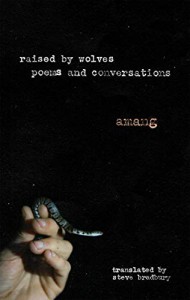This month’s selected new translations from around the world cross more than geographic boundaries: the first combines deliciously feral Taiwanese poetry with exclusive, first-hand conversations on the process of writing and translating it; the second features a series of stylistically varied but equally poignant essays on an acclaimed German author’s personal and political journey. Both titles prompt us to peek into their subjects’ fascinating lives and work, and we’re all too happy to indulge.

Raised by Wolves: Poems and Conversations by Amang, translated from the Chinese by Steve Bradbury, Deep Vellum, 2020
Review by Filip Noubel, Editor-at-Large for Uzbekistan
When I agreed to review Raised by Wolves, I thought I had signed up to read a translation of contemporary Taiwanese poetry. I very quickly realized my mistake: Raised by Wolves is much more than that; it is an invitation to partake in a feast of words that agree to disagree, that clash and dissolve to reemerge in another language. It is also an act of transgressive eavesdropping, as the poet and her translator let readers in on their intimate discussions about their craft (the book’s subtitle is “poems and conversations”).
Amang has published several collections, including On/Off: Selected Poems of Amang, 1995-2002 (2003), No Daddy (2008), Chariots of Women (2016), and As We Embrace Thousands Are Dying (2016). In addition, she is a filmmaker and blogger, and her eclectic interests are clearly reflected in this new translation of her work. A couple of themes, however, seem to be especially prevalent throughout.
First, as the poet discloses (incidentally explaining her collection’s English title), she was raised mostly by her grandmother, who “was quite a character. She was very powerful and courageous. A she-wolf. She would do or say whatever she wanted. None of th[at] Confucian nonsense for her.” In line with this almost feral sentiment, many poems include raw images celebrating nature or the vibrance of the human body. In one, for instance, Amang writes: “Thrusting your hand down a tiger’s throat / to tear out his heart / so, too, I / cut from a book a sheet of / ice.” And elsewhere: “I can give you anything / . . . / except that puny little stick / they call a prick / and is that worth making a fuss about?”
Other poems explore our hopelessness in the face of modernity, interrogating our mediated relationship with the world. Current staples like Siri or the GPS make their appearance here and there, and this humorous, bite-sized piece is another case in point:
I miss you 400 Bad Request
I want you 403 Forbidden
I want you so much 402 Payment Required
I want to see you 404 Not Found: Page Cannot Be Displayed.
As can be gauged from the above, the style of many poems is as modern as their content. When I read the original Chinese (Raised by Wolves is a bilingual edition, as any poetry book in translation should be), I became quickly entranced by its audacity and authenticity. Chinese poetry has been shaped by an extensive canon, which can sometimes represent an overwhelming burden. Amang’s poetic language, however, is inspired by daily conversation, twenty-first-century lingo, and loanwords from the English, all of which comes as a refreshing surprise.
So do the conversations between her and translator Steve Bradbury. In my almost thirty years as a literary translator, I have engaged mostly with fiction (and, on occasion, contemporary poetry from mainland China and Belarus), but I’d never had a chance to explore contemporary Taiwanese poetry from a translator’s perspective. That, in itself, would have been enough, but these exchanges are extraordinary to boot—not just because they are totally unexpected, but mostly because of their biting honesty, generous humor, and provocative originality.
I have been reading an equally provoking essay titled Traduction et violence (Translation and violence) by French author, academic, and translator Tiphaine Samoyault. She argues that “the transformation of the target language is one of the creative powers of translation. This process creates unexpected syntax, strange words, forgotten and lost words.” This is precisely what Amang and Bradbury discuss, providing a glimpse into the back-and-forths that often precede a translation’s final version. I had a chance to ask Bradbury himself about the process. He replied:
I see my primary task as representing the source text, and to that end I always insist on working closely with the author to ensure I understand what he or she has written and, in return, that he or she understands the various options I have for representing that in English.
Chinese-to-English translation requires dealing with two wildly different linguistic systems; the gaps in syntax, grammar, phonetics, and cultural references make it particularly challenging. Amang and Bradbury, however, take a humorous approach to these seemingly insurmountable obstacles. The poet, for example, mocks grammatical tenses in English that are virtually absent in Chinese:
I remember the first time I was learning English and was introduced to verb tenses. It was such a shock! Eat, ate, eaten. What horrible ideas! It was like language had been given the plague of old age, sickness, and death. It was like the fall from Eden, the fall [from] grace. In Chinese, every verb is immortal, eternal, for all time. Past, present, future—they mean nothing to it. Besides, why bother with tenses when you can indicate time with adverbs?
Bradbury, for his part, provides many examples of how to retain the original’s meaning while granting the translation its own rhyme and rhythm. One of the poems, for instance, reads 大家都在哭 / 沒有人忍住 , which literally means “Everyone is crying / no one can hold back,” but he elegantly renders it as “Everybody had to cry / not a single eye was dry.” In conversation, Amang responds: “oh, I love that! It rhymes like my Chinese!”. Bradbury adds he took a number of such liberties throughout, “to amp up the musicality or enrich the suggestiveness of a line or phrase,” usually to “compensate for other[s] I felt were decidedly inferior to Amang’s Chinese.”
Perhaps that is the best approach to literary translation in general, and to poetry translation in particular—to accept that what is “lost” at one point can be regained at another, even within a short poem’s limited scope. One thing is certain, though: readers of this delightfully hybrid collection can only win.

Not a Novel: A Memoir in Pieces by Jenny Erpenbeck, translated from the German by Kurt Beals, New Directions, 2020.
Review by Daljinder Johal, Assistant Managing Editor
Jenny Erpenbeck’s Not a Novel: A Memoir in Pieces is a moving, thought-provoking collection of essays on the prize-winning German writer’s personal and political life, welcoming both long-time devotees and newcomers to her work. Split into three sections—“Life,” “Literature and Music,” and “Society”—it demonstrates the same fascination with silence and impermanence that shines through in the author’s works of fiction.
Erpenbeck reminisces about her childhood in East Berlin and the GDR, the apparent “freedom” that followed the fall of the Berlin Wall, and the struggle to find her feet as a young adult working in a bakery. While spending “three days a week” to “cook hard boiled eggs and make rolls in sandwiches,” she gradually finds her way to writing—which, as it turns out, develops from an interest in music, opera, and theater. As readers peek behind the curtain of the author’s life, they are pushed to reflect on their own experiences with loss and young adulthood, as well as on scenarios that are less directly familiar to many, such as growing up amid the physical ruins of war.
The author makes several references to the latter throughout the book: “I had my first rendezvous with the high-school boyfriend [. . .] in the ruins of Deutscher Dom,” she says at one point, and she later relates how her father would tell her “the same story as we drove past Alexanderplatz in our Trabant, pointing to the construction fence across from Berlin’s Town Hall and recalling the mummified bodies from the Biedermeier era.” Death, however, hits even closer to home: the book opens with an account of her mother’s passing, alluded to in the preface and first chapter, through the haunting silence of an empty apartment. Erpenbeck casts a simultaneously personal and critical eye on this heartbreaking event. Indeed, the remnants of war—sites of public violence and loss—seem easier for her to make peace with than the near impossible levels of bureaucracy and inhumanity involved in arranging her mother’s apartment and funeral affairs.
As much as she knows how to delve into pain or horror, Erpenbeck also has a knack for narrating the unexpected from a humorous angle. The collection is filled with quirky vignettes that will make readers laugh or roll their eyes at the absurdity of certain societal norms—from the author’s burial of a pressure cooker to her finding “a principal who’s willing to let me enroll in eleventh grade with a fake name, a fake address, and a fake birthdate, so that I can gather material for my book.”
For those passionate about the art of writing, “Literature and Music” provides fascinating glimpses into the acclaimed author’s mind. Its subject matter and relative length, however, risk alienating others. Erpenbeck’s inclusion of certain speeches delivered over her career could, perhaps, have been pared down for more general audiences, as it may be of particular interest to literary critics. Still, all readers should be able to appreciate the author’s enthusiasm for fairy tales, or her musings on the impossibility of a universal language: even the “gestures for walking, sleeping, eating, drinking, loving and fighting that deaf people use in English are different from the gestures [. . .] used in Greek, Russian or Chinese.”
This collection may be “a memoir in pieces,” but it benefits from careful construction, moving seamlessly between themes, events, and even narrative styles. The short essay “Hope,” for instance, provides a poetic account of the author’s family history as they live through Nazi Germany and the Cold War; going all the way back to her great-grandfather, Erpenbeck intersperses depictions of some of the most terrible historical events on record with those of Christmas treats and other small domestic joys. Connecting each moment in time, however, is the notion that parents want what’s best for their children.
By contrast, “Society” (the book’s final section) looks to the future. Here—and, more specifically, in “An Obituary for Bashir Zakaryau” and the 2018 keynote at the Puterbaugh Festival—Erpenbeck makes a passionate argument for the plight of refugees across the world. Drawing parallels between “the Germans who died attempting to flee over the wall” and “the countless refugees who have died in the Mediterranean in recent years, turning the sea into a giant grave,” she cleverly resorts to both her own experience and her writings on impermanence and silence, memory and history, to bring the collection to an elegant close.
This is not a novel, not just a memoir, not an invitation to merely reflect on our past and present, but an active encouragement to acknowledge “memory” as “an instrument” and wield it usefully towards a shared future.
*****
Read more from the Asymptote blog:

